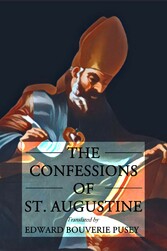Suchen und Finden
Service

The Confessions of St. Augustine
St. Augustine
Verlag CrossReach Publications, 2019
ISBN 6610000146093 , 440 Seiten
Format ePUB
Kopierschutz DRM
I—He Proclaims the Greatness of God, Whom He Desires to Seek and Invoke, Being Awakened by Him.
II—That the God Whom We Invoke is in Us, and We in Him.
III—Everywhere God Wholly Filleth All Things, But Neither Heaven nor Earth Containeth Him.
IV—The Majesty of God is Supreme, and His Virtues Inexplicable
V—He Seeks Rest in God, and Pardon of His Sins.
VI—He Describes His Infancy, and Lauds the Protection and Eternal Providence of God.
VII—He Shows by Example That Even Infancy is Prone to Sin.
XIV—Why he Despised Greek Literature, and Easily Learned Latin.
XV—He Entreats God, that Whatever Useful Things he Learned as a Boy May be Dedicated to Him.
XVII—He Continues on the Unhappy Method of Training Youth in Literary Subjects.
I—He Deplores the Wickedness of His Youth.
VIII—In His Theft He Loved the Company of his Fellow-Sinners.
IX—It was a Pleasure to Him Also to Laugh When Seriously Deceiving Others.
X—With God There is True Rest and Life Unchanging.
VIII—He Argues Against the Same as to the Reason of Offences.
IX—That the Judgment of God and Men, as to Human Acts of Violence, is Different.
X—He Reproves the Triflings of the Manichæans as to the Fruits of the Earth.
XI—He Refers to the Tears, and the Memorable Dream Concerning Her Son, Granted by God to His Mother.
IV—Sorely Distressed by Weeping at the Death of His Friend, He Provides Consolation for Himself.
V—Why Weeping is Pleasant to the Wretched.
VI—His Friend Being Snatched Away by Death, He Imagines that He Remains Only as Half.
VII—Troubled by Restlessness and Grief, He Leaves His Country a Second Time for Carthage.
VIII—That His Grief Ceased by Time, and the Consolation of Friends.
X—That All Things Exist That They may Perish, and That we are not Safe Unless God Watches Over Us.
XIII—Love Originates From Grace, and Beauty Enticing Us.
XIV—Concerning the Books Which He Wrote “On the Fair and Fit,” Dedicated to Hierius.
I—That It Becomes the Soul to Praise God, and to Confess Unto Him.
II—On the Vanity of Those Who Wished to Escape the Omnipotent God.
VI—Faustus was Indeed an Elegant Speaker, but knew Nothing of the Liberal Sciences.
VIII—He sets out for Rome, his mother in vain lamenting it.
IX—Being attacked by fever, he is in great danger
XI—Helpidius disputed well against the Manichaeans as to the authenticity of the New Testament.
XII—Professing rhetoric at Rome, he discovers the fraud of his...


